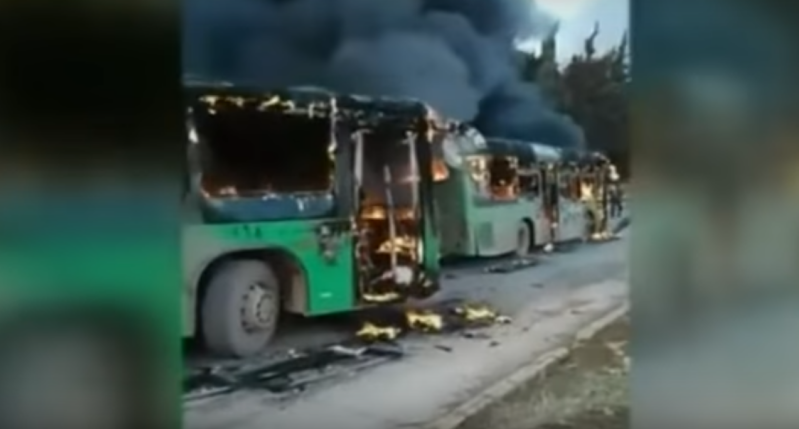
Five buses that were to transport the trapped Syrians in Aleppo were set ablaze by armed men. The men forced the drivers out of the buses and shot the vehicles setting them on fire.
The vehicles were meant to transport the injured and sick Syrians from two pro-government towns, according to BBC. The evacuation was said to be a mediation to free the remaining east Aleppo civilians that are stranded in exchange for the wounded people. This negotiation was halted because of the incident.
The group responsible for the attack was the al-Qaeda-affiliated Fatah al-Sham Front, according to the Syrian Observatory for Human Rights. A fight between the rebels who supported the evacuation and a Lebanese militant group called Hezbollah broke out. An angry group of people who supported the government was said to be also responsible for the attack, according to the Independent.
The Free Syrian Army, a moderate-rebel group, condemned the attack.
"The people who resisted in Aleppo are paying the price of the irresponsible acts of a few. This was a reckless act endangering the lives of more than 50,000 people. It is a crime and a humiliation against our revolution and the resistance of the besieged Aleppo people," the faction stated.
The attack incidentally happened after Russian Ambassador to the UN Vitaly Churkin stated that Russia will veto the UN vote that will allow international observers to conduct the evacuation and support the evacuees especially the injured individuals.
"We cannot support it, we cannot allow it to pass because this is a disaster. But there could be another thing which could be adopted today by the Security Council which would accomplish the same goals," Churkin said.
However, the US ambassador to the UN Samantha Powers stated that they expect to "vote unanimously for this text tomorrow [Monday]." The three-hour long negotiations of the Security Council might have resulted to a successful parley.
The presence of international forces can prevent further humanitarian felonies that are conducted in the midst of the evacuation process.
Ahmad Al-Dbis, head doctor of one of the teams coordinating in the evacuation at rebel-held enclaves, stated the worse conditions of the evacuees, according to the Guardian.
"They were in a terrible state," he said. "They hadn't eaten, they had nothing to drink, the children had caught colds, they were not even able to go to the toilet."







